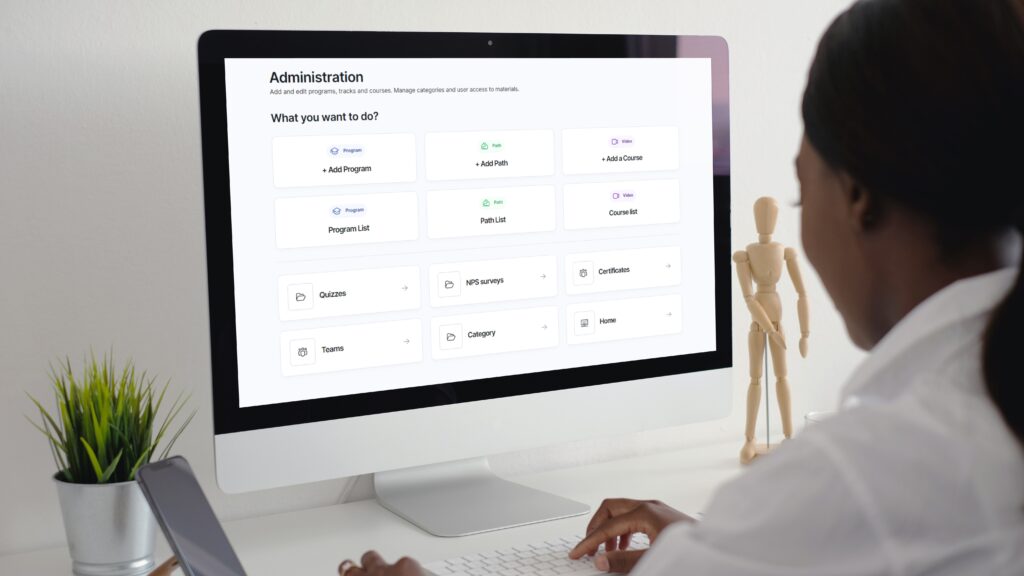
E-learning platforms: streamlining training processes through automation
An e-learning platform has become a vital tool in modern HR strategies, enabling organizations to efficiently manage resources and enhance employee retention. By leveraging advanced Learning Management Systems (LMS), companies can not only achieve basic benefits like cost savings and centralized training content but also unlock more sophisticated outcomes that significantly impact their long-term growth.

The e-learning platform, as a tool supporting onboarding and employee development, offers a range of benefits, including:
1. Saving time and reducing costs with automation
Automating training processes results in considerable savings of both time and money. An advanced e-learning platform automates tasks such as participant registration, content distribution, and progress tracking. According to McKinsey & Company, technology firms that have embraced automated training processes have seen a 25-30% reduction in training-related operational costs within a year.
Example: Automated reminders for training sessions and the generation of course completion certificates reduce the need for manual oversight by HR teams, alleviating administrative burdens.
LMS platforms can also integrate with ERP (Enterprise Resource Planning) and CRM (Customer Relationship Management) systems, ensuring that training data is automatically updated across the company’s operational systems, reducing errors and improving data consistency.
2. Centralizing and updating training content
Centralizing training materials on a single platform simplifies content management and updates, ensuring that all resources are accessible from one location. This is particularly beneficial for large organizations where employees across various locations need consistent access to the same materials.
Example: For global corporations, centralizing training content on an LMS platform allows for simultaneous updates and the implementation of new training modules across different regions, minimizing the costs associated with local adaptations and in-person training.
An advanced e-learning platform also enables automatic monitoring of training materials to ensure compliance with local regulations, which is critical in highly regulated industries like pharmaceuticals and finance. Updates are instantly visible to all users, maintaining consistent knowledge across the organization.

3. Personalizing learning paths
Sophisticated LMS platforms use advanced machine learning algorithms to analyze user progress and dynamically tailor training content. This approach facilitates personalized learning paths that align with the specific needs and skills of individual employees.
Example: In the rapidly evolving IT industry, dynamic personalization ensures that training programs are continuously updated to reflect the latest trends and technologies, enhancing the learning experience. Employees receive content that matches their skill level and job roles, leading to better knowledge retention and practical application.
These algorithms not only analyze test results but also track user interactions, time spent on various modules, and learning behaviors, enabling the platform to predict potential challenges and adjust content accordingly to mitigate them.
4. Analyzing progress
Automation allows for seamless integration with analytical tools, which provides deeper insights into talent management. By collecting and analyzing data, companies can better plan for employee development and anticipate future training needs.
Example: In financial institutions where precision and regulatory compliance are paramount, talent analytics integrated with the LMS can identify skill gaps within teams and recommend targeted training. For instance, a bank might use LMS data analysis to recognize the need for training on new regulations.
Analytics also facilitates the monitoring of employee career development, enabling organizations to manage career paths effectively. The e-learning platform can predict future skill requirements and suggest relevant training to employees, increasing their value both within the organization and in the job market.

5. Utilizing social features
Modern LMS platforms support the creation of virtual learning communities, encouraging knowledge sharing and fostering a culture of continuous improvement within the organization.
Example: In tech companies, where innovation drives success, the social features of LMS platforms enable employees to collaborate on projects, share knowledge, and solve problems collectively, leading to faster innovation cycles.
An e-learning platform can also support online mentoring and coaching, where experienced employees share their expertise with newer team members. Discussion groups around specific training topics and real-time collaboration tools further enhance engagement and knowledge retention.
6. Ensuring compliance
Automation in training processes helps organizations better manage compliance requirements, which is especially important in regulated industries. Automated reports and reminders allow companies to avoid fines and issues related to non-compliance.
Example: In the pharmaceutical industry, where adherence to strict regulations is essential, automatically tracking participation in training on new regulations can reduce errors and ensure compliance with current standards.
LMS platforms can generate detailed reports on training participation and compliance test results, which are crucial for both internal and external audits. Automation also helps organizations monitor compliance with local regulations across different jurisdictions, a key factor for globally operating companies.

E-learning platform: summary
Automating training processes offers organizations not only time and cost savings but also advanced benefits that are essential for long-term success. With modern LMS platforms, companies can effectively manage talent, boost employee retention, and ensure regulatory compliance. In a world where adaptability and continuous improvement are critical, automation becomes a tool that not only streamlines operations but also supports strategic management.
